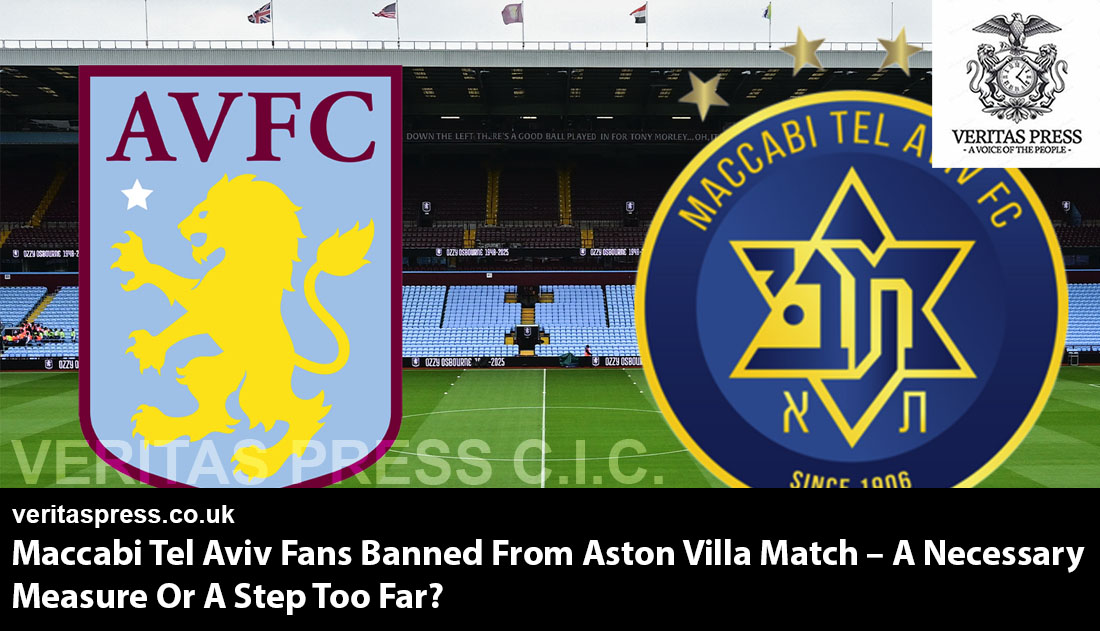Press Release: Veritas Press C.I.C.
Author: Kamran Faqir
Article Date Published: 18 Oct 2025 at 13:12 GMT
Category: UK | Politics-Sports | Maccabi Tel Aviv Fans Banned From Aston Villa Match
Source(s): Veritas Press C.I.C. | Multi News Agencies

Business Ads


UK-BIRMINGHAM – In a move that has sparked political and public controversy, West Midlands Police and Birmingham City Council have banned fans of Israeli football club Maccabi Tel Aviv from attending their upcoming UEFA Europa League match against Aston Villa at Villa Park on November 6, 2025. The decision, based on safety concerns and previous incidents involving Maccabi fans, has ignited a debate over public safety, discrimination, and the role of politics in policing decisions related to sporting events.
Background: Previous Incidents Involving Maccabi Fans.
The decision to bar Maccabi Tel Aviv fans follows a series of violent incidents involving the club’s supporters in European cities. Notably, during a 2024 Europa League match in Amsterdam, Maccabi fans were involved in clashes with pro-Palestinian groups, leading to injuries and arrests. Reports indicated that Maccabi supporters tore down Palestinian flags, shouted anti-Palestinian slogans, and engaged in violent confrontations with locals. In November 2024, the Amsterdam riots resulted in seven people being hospitalised and over 60 arrests, prompting Dutch authorities to issue emergency measures in the city.
In addition to the Amsterdam incident, there have been other reports of Maccabi fans engaging in violent behaviour. For instance, in March 2024, tensions erupted among Maccabi supporters in Athens when they assaulted a man of Arab descent who was exiting a metro station. Such incidents have raised concerns about the conduct of certain segments of the Maccabi fanbase and their potential to incite violence at future matches.
The Ban: Rationale and Reactions.
West Midlands Police and Birmingham City Council’s Safety Advisory Group (SAG) deemed the fixture “high risk” due to intelligence and past incidents of violence involving Maccabi fans. The SAG’s decision to prohibit away supporters from attending was made to mitigate risks to public safety.
The ban has elicited strong reactions from various political figures. Prime Minister Keir Starmer criticised the decision, calling it “the wrong decision” and emphasising the importance of protecting fans from antisemitism while ensuring safe and inclusive attendance at football matches. Culture Minister Lisa Nandy and Communities Secretary Steve Reed have also expressed concerns and are engaging with relevant parties to find a resolution.
Conversely, some political figures and advocacy groups have supported the ban, citing safety concerns and the need to address deeper issues linked to Israel’s policies toward Palestinians. Independent MP Ayoub Khan has argued that any Israeli team should be barred from sporting events as part of a broader campaign against the Israeli government’s treatment of Palestinians.
The Role Of Politics And Discrimination:
The decision to bar Maccabi Tel Aviv fans has raised questions about the intersection of politics, discrimination, and public safety. While authorities have cited safety concerns as the primary rationale for the ban, some critics argue that the decision may be influenced by political considerations related to the Israeli-Palestinian war. The involvement of political figures in the debate underscores the complex nature of the issue and the challenges in balancing public safety with individual rights and freedoms.
The Jewish Leadership Council and Maccabi Tel Aviv’s CEO have condemned the ban, labelling it as discriminatory and antisemitic. They argue that the decision unfairly targets Israeli fans based on their national identity and could set a dangerous precedent for future sporting events.
Conclusion: A Necessary Measure Or A Step Too Far?
The decision to ban Maccabi Tel Aviv fans from attending the match against Aston Villa may be contentious, but it is a necessary measure to prevent potential violence and ensure public safety. The actions of a minority of fans have led to significant incidents in the past, and authorities must take proactive steps to prevent similar occurrences. It is crucial to balance the rights of individuals with the need to maintain public order and safety.
While the banning of Maccabi fans is welcomed as a preventative measure, it is only a partial response to a far deeper problem. The team itself, and by extension the nation it represents on the international stage, cannot escape scrutiny. Beyond the stadium terraces, Israel’s military actions in Gaza, marked by widespread civilian casualties, destruction of homes, and allegations of ethnic cleansing, have made the club’s presence in Europe a flashpoint for tensions. The Maccabi team, knowingly or not, carries the symbolic weight of these actions, and its international fixtures cannot be divorced from the broader political and humanitarian context. In this sense, the club itself deserves to be critically examined and, at minimum, panned for its nation’s systematic violence and the impact of that symbolism on fans, residents, and local communities abroad.
The violent and incendiary behaviour of a minority of supporters, documented in Amsterdam, Norway, and elsewhere, is inseparable from this wider context. Birmingham authorities acted in good faith to prevent Norwegian-style chaos on UK soil, prioritising public safety and averting what could have been a mass confrontation between aggressive visiting fans and local residents. Yet the ban also exposes the uncomfortable intersection of sport, politics, and operational responsibility. Civil liberties, freedom of movement, and the right to attend sporting events must be weighed against the demonstrable risks of violence and intimidation. The Maccabi club’s institutional responsibility, its failure to rein in ultra groups and address racist, Islamophobic behaviour, means that, until reforms are implemented, both the fans and the team remain potential vectors for unrest.
As discussions continue, it is essential to focus on finding solutions that address the root causes of fan violence and promote a safe and inclusive environment for all spectators. The Aston Villa–Maccabi Tel Aviv fixture is therefore more than a football match; it is a test of governance, intelligence-led policing, and society’s capacity to navigate identity, ideology, and risk. While accusations of discrimination and antisemitism have clouded public debate, the operational reality is stark: preventing foreseeable harm must take precedence.
In short, safety cannot be sacrificed for optics or political expediency. The banning of Maccabi fans is a prudent step, but it is insufficient on its own. The club and its nation’s actions demand scrutiny, accountability, and, where possible, sanctions. Until Maccabi Tel Aviv, and the state it represents, can demonstrate that neither violence nor the projection of state-sanctioned oppression will mar their participation abroad, restrictions remain not only justified but essential.
Latest Developments:
In response to the ban, the UK government is collaborating with police and reviewing additional resources to allow fans of Maccabi Tel Aviv to attend the match. Prime Minister Keir Starmer has called the decision “the wrong decision” and emphasised the importance of protecting fans from antisemitism while ensuring safe and inclusive attendance at football matches. Culture Minister Lisa Nandy and Communities Secretary Steve Reed are engaging with relevant parties to find a resolution.
Despite the government’s efforts, the controversy continues to unfold, highlighting the complex intersection of sport, politics, and public safety. The outcome of this situation may set a precedent for how similar issues are handled in the future, balancing the need for security with the principles of fairness and inclusion.


























0oim56